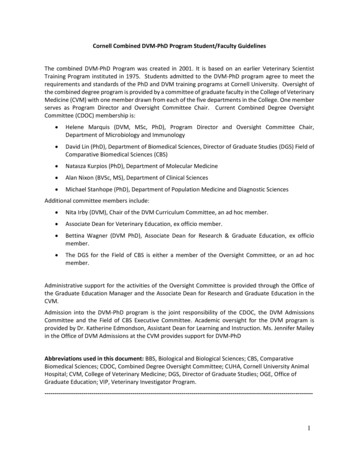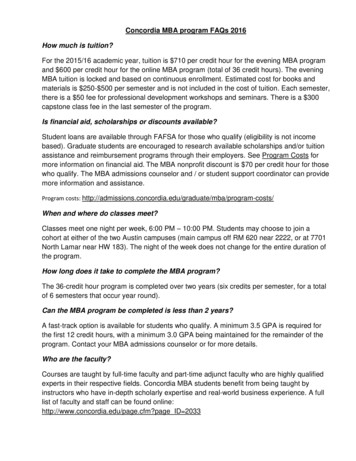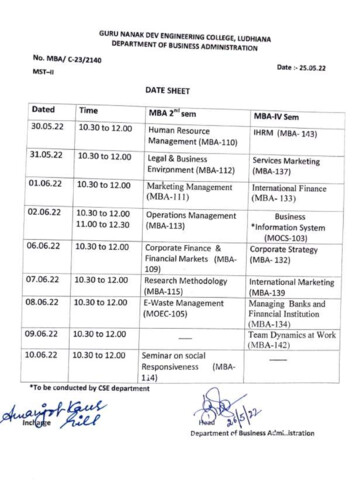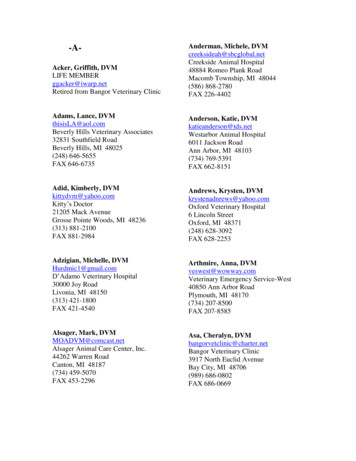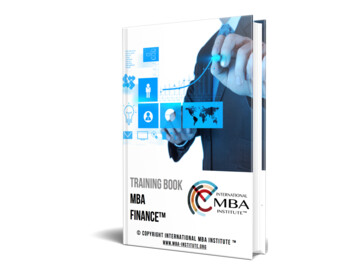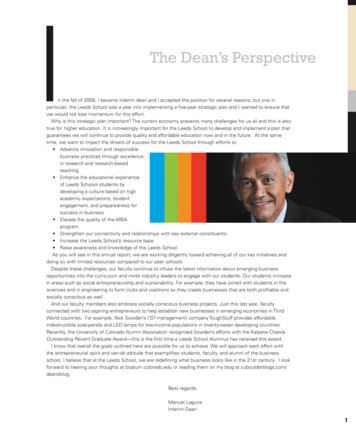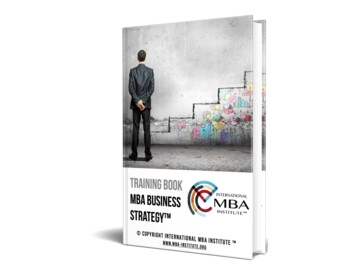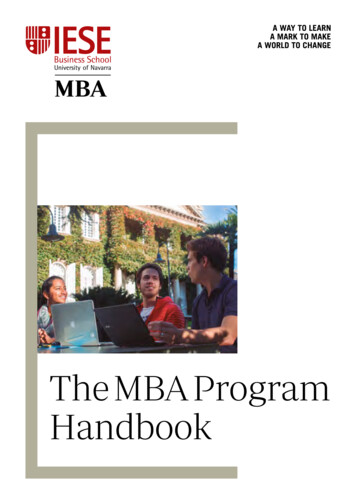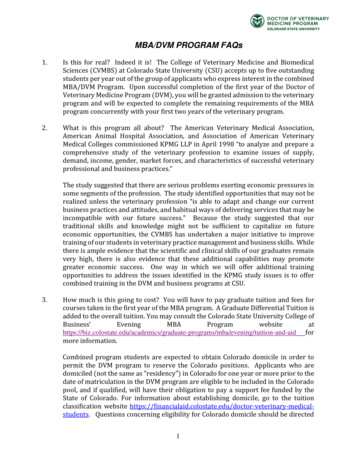
Transcription
MBA/DVM PROGRAM FAQs1.Is this for real? Indeed it is! The College of Veterinary Medicine and BiomedicalSciences (CVMBS) at Colorado State University (CSU) accepts up to five outstandingstudents per year out of the group of applicants who express interest in the combinedMBA/DVM Program. Upon successful completion of the first year of the Doctor ofVeterinary Medicine Program (DVM), you will be granted admission to the veterinaryprogram and will be expected to complete the remaining requirements of the MBAprogram concurrently with your first two years of the veterinary program.2.What is this program all about? The American Veterinary Medical Association,American Animal Hospital Association, and Association of American VeterinaryMedical Colleges commissioned KPMG LLP in April 1998 “to analyze and prepare acomprehensive study of the veterinary profession to examine issues of supply,demand, income, gender, market forces, and characteristics of successful veterinaryprofessional and business practices.”The study suggested that there are serious problems exerting economic pressures insome segments of the profession. The study identified opportunities that may not berealized unless the veterinary profession “is able to adapt and change our currentbusiness practices and attitudes, and habitual ways of delivering services that may beincompatible with our future success.” Because the study suggested that ourtraditional skills and knowledge might not be sufficient to capitalize on futureeconomic opportunities, the CVMBS has undertaken a major initiative to improvetraining of our students in veterinary practice management and business skills. Whilethere is ample evidence that the scientific and clinical skills of our graduates remainvery high, there is also evidence that these additional capabilities may promotegreater economic success. One way in which we will offer additional trainingopportunities to address the issues identified in the KPMG study issues is to offercombined training in the DVM and business programs at CSU.3.How much is this going to cost? You will have to pay graduate tuition and fees forcourses taken in the first year of the MBA program. A Graduate Differential Tuition isadded to the overall tuition. You may consult the Colorado State University College ning/tuition-and-aid formore information.Combined program students are expected to obtain Colorado domicile in order topermit the DVM program to reserve the Colorado positions. Applicants who aredomiciled (not the same as "residency") in Colorado for one year or more prior to thedate of matriculation in the DVM program are eligible to be included in the Coloradopool, and if qualified, will have their obligation to pay a support fee funded by theState of Colorado. For information about establishing domicile, go to the tuitionclassification website ry-medicalstudents. Questions concerning eligibility for Colorado domicile should be directed1
to the Colorado State University Office of Student Financial Services, 103Administration Annex (970) 491-6321, please let them know you are applying to theMBA/DVM Program. If you obtain Colorado domicile, you will be admitted to theDVM portion of the Combined Program in fall 2024 in a Colorado sponsored position.DVM costs for Colorado positions are approximately 39,000 for the 2021-22academic year. If you do not obtain Colorado domicile, you will be admitted to theDVM portion of the Combined Program in fall 2024 in a Nonsponsored position. DVMprogram costs for Nonsponsored positions are approximately 63,000 for the 202122 academic year. Tuition and Graduate Differential Tuition will continue to beincurred for the Evening MBA Program once in the DVM Program.4.How do I get admitted/enrolled at CSU for the fall MBA graduate semester? Onlyadmitted candidates for the combined MBA/DVM Program will be required to submitan online Graduate School Application, complete a soft skills assessment throughJERA Partnerships, and complete the College of Business’ Applicant Data Sheet. Youwill find both of these forms at hen filling out the online Graduate School Application indicate you are applying forBUSA-VM-MBA program. The CVMBS will forward your veterinary applicationmaterials and transcripts to the College of Business to complete their files. TheCollege of Business will pay the application fee of 60 as well as the soft skillsassessment of 65. If additional documentation is required, you will be notified.5.Do I have to apply again to the DVM Program? No! All students who are admitted toand successfully complete the first year of the combined program with a 3.0 GPA orgreater will be automatically admitted to the DVM program the following year.However, you will be requested to accept an offer to the DVM program and in Augustasked to update your personal contact information/tuition classification. It is notnecessary to submit a second VMCAS Application. No additional application fees arerequired.6.Under which category will I be admitted to the Doctor of Veterinary MedicineProgram? It is expected that all Combined Program students will be admitted toColorado sponsored positions, and thus will pay Colorado-sponsored tuition and feesonce in the veterinary program (approximately 39,000 per year for 2021-22). It issuggested that you move to Colorado at least a month (mid-late July) in advance ofthe start of classes in the first year of the combined program in order to have time totake the steps necessary to establish Colorado domicile. For information edical-students.7.Are there financial awards associated with the Program? Yes! There is a graduateassistantship through the College of Business. This will reduce the cost of theprogram. The College of Business offers assistantships for first-year MBA/DVM studentswho register for eight or more credits of course work. Assistantshipapplications are due to the College of Business Office of Graduate Admissionson or before March 1st. MBA/DVM students qualified for assistantships areexpected to work approximately 10 hours per week for one of the Business2
departments. The assistantship pays ½ of the tuition (in-state or out-of-state)for the first fall and spring semesters. Additionally, there is a stipend of about 845 pre-tax per month(2 semesters total) to use toward the GraduateDifferential Tuition, fees, textbooks, or other academic fees. Assistantships donot cover the Graduate Differential Tuition.In addition, many students are able to obtain scholarships through the Officeof Student Financial Services ry-medical-students). Federal Student Aid for MBA students is basedon numbers of credits per semester. Students are eligible for “tuition only”levels of aid at 5 semester credits. Since the MBA program requires 8 creditsper semester during the first year of the combined program, MBA/DVMstudents would be credit-eligible for "full cost of education" financial aid.8.If I receive an offer to the MBA/DVM program, will my application still be evaluatedin the regular admissions pool? If you indicate you wish to be considered for theMBA/DVM program (on the Colorado Supplemental Application), your applicationwill additionally be considered in the regular DVM admissions pool. When decisionsare released, if a candidate receives an OFFER to the MBA/DVM program, he/she willnot be further considered in the regular DVM admissions pool, regardless of whetheror not he/she accepts or declines the MBA/DVM offer. If you are denied or designatedas an alternate for the MBA/DVM program, your application will be considered in theregular DVM admissions pool.9.What is the curriculum of the MBA/DVM Program? This will be discussed at theorientation. A copy of the curriculum and course schedule is available for -mba-course-schedule.pdf.10.Must I have completed my undergraduate degree in order to be admitted to thecombined program? Yes. Although you may be accepted to the DVM Program withoutcompleting a Bachelor’s degree, this is still required for you to begin the MBAProgram. You may apply for admission to the combined MBA/DVM Program prior toreceiving your undergraduate degree, but you must have completed all your degreerequirements for your Bachelor’s degree prior to matriculation in the fall.11.Are students with real world work experience given priority? Yes. MBA courseworkis application based and team oriented; those with work experience are better ableto both contribute to class discussions and understand concepts that are beingdiscussed. For that reason, applicants are encouraged to have at least two years offull-time professional work experience.12.Can I take MBA classes this upcoming summer as I claim residency and move toColorado in June? It may be possible to take electives offered in summer during thistime. You may contact Catie Rohloff at catie.rohloff@colostate.edu or 970-491-5634for information about elective course offerings.13.Is the DVM curriculum taught through lectures/labs or problem-based learning? Howare students assessed/graded in the courses they take? How are they ranked againstone another?3
14.Do DVM students have the opportunity to interact with patients during their firstyear? What type of patient contact, interactions, and clinical skills do they learnduring their first year? 15.A combination: many classes are taught in a didactic lecture format with PBL(problem based learning) components. The “Foundations of VeterinaryMedicine” course spans the first two years of the curriculum and is taughtmainly in a small-group format. Students will work in groups of 10-20students and complete a variety of hands-on labs (physical exam skills,surgical skills, animal handling) as well as case-based discussion sessions.These activities are led by clinicians from the VTH and private practice aswell as specially trained veterinary technicians.Please see the student handbook for an explanation of student evaluation,academic standards, class rank, andgrades: pdf.Students interact with animals as 1st year students in order to reinforcestudent knowledge of normal/appropriate anatomy and function.First-year students may also sign up for after-hour clinical experiences suchas “Large Animal Emergency Service” and “Foal Watch” and otheropportunities.MBA/DVM students may become active in veterinary related student clubsstarting in their first year in the combined program. There are numeroushands on learning experiences available through club labs and events. Mostof these clubs are sponsored by SCAVMA (Student Chapter of the AmericanVeterinary Medical Association).There are no required rotations in the first year in the hospital. Refer to thecurriculum guide for courses in each of the 4 years of the veterinarycurriculum: ploads/sites/6/2019/06/dvm-curriculum.pdf.Where have past MBA/DVM students ended up after completing the program? Whatis the average compensation of MBA/DVM graduates? How do most MBA/DVMgraduates find their first job? Do institutions/organizations look to CSU first to recruitMBA/DVM graduates or do MBA/DVM graduates have to proactively look fororganizations that are searching for such graduates? Average compensation: From our first outcomes assessment survey therespondents indicated a starting salary was on average 20% higher than themean starting salary for other graduates. Please note, this figure excludesthose individuals who entered internship or residency positions aftergraduation because they all are significantly lower in compensation than anon-internship position. The survey also indicated an average increase insalary of 100% from their first salary until they took the survey (at most 4years post graduation). This is a significantly higher rate of salary increasethan other veterinarians. Please note: internship positions and residencypositions are traditionally very low paying (average of 25,000 for an4
internship and 35,000 for a residency position). Salaries for otherveterinary positions are significantly higher.How do students find their first job? Students that go into internships do sothrough the internship match port-services/. Other graduates of theMBA/DVM Program found their first jobs through connections they hadestablished through the program or a search of a geographic targetarea. There is a career liaison through the college of veterinary medicine thatsome students utilize. In general, this is a self directed activity. Informationabout job search strategies is covered in VM 712, Professional Developmentin the 3rd year. Note: this program has received quite a bit of attention frompractice owners and companies. As such some students have been activelyrecruited into positions.What difference does the MBA make with respect to career options aftergraduation? All respondents of the outcomes survey indicate the MBA wasvery beneficial in securing their first position out of veterinary school. Allresponded they secured their first choice position. For some respondents theMBA was critical for their jobs. Many responded they utilize the MBAskills/knowledge in their daily job, is an important factor in their jobsatisfaction, advancement opportunities, job customization to their interests,salary, autonomy, and leadership opportunities. All reported the MBA wasbeneficial for their career.As of May 2021, there have been 66 graduates to complete bothprograms. Some positions that graduates of the program have landedinclude:1.2.3.4.5.6.7.8.Medical directorNational policy work in Washington D.C.IndustryAcademia/administrationSmall business ownershipResidenciesInternshipsPrivate practice associateAdditionally, some have established businesses separate from their veterinarywork.16.What should be covered in the separate narrative submitted as part of my CombinedProgram application in the Colorado Supplemental Application? Applicants to theCombined Program must submit a separate narrative that specifically addresses theirmotivations for participating in the Combined Program, as well as a description ofcomplementary experiences they have had. Tell us what past experiences in your lifehave contributed to your interest in combined training. Share any pertinent workexperiences, observations of practices’ business procedures, or previous collegiatetraining in business, finance, or public administration. What is the importance ofpractice management training to the success of veterinarians in private or corporatepractice? How will the combined training affect your career and uniquely contributeto the profession. Consider addressing your ability to handle the additional course5
work with examples. It is very important to summarize your previous full-timeprofessional experience, as only candidates with significant work experience will beconsidered. Typically, clinical technician experience is not sufficient to qualify as fulltime professional experience.17.What is CSU like in general? As you may be aware, CSU's veterinary program wasrecently ranked as #3 in the nation by the 2014 US News and World Report. TheEvening MBA is exceptional. The program is digitally produced with a videoproduction team who collaborates with faculty and staff to present world-classacademic content and digital learning experiences using cutting-edge equipment andtechnology. Colorado State University’s Online/Evening MBA is ranked among the topprograms in the nation according to Quacquarelli Symonds (QS) 2020 survey. CSU’sonline MBA program ranks No. 1 in Colorado, No. 34 among public universities, andin the top 17% of programs in the United States.18.How do I get around town? There is a bus system that many students utilize, as wellas well-designed bicycle lanes and paths throughout the city. Information on theTransfort system may be accessed at http://fcgov.com/transfort/, and information onbicycling can be accessed at http://fcgov.com/bicycling/bike-maps.php.11.15.216
levels of aid at 5 semester credits. Since the MBA program requires 8 credits per semester during the first year of the combined program, MBA/DVM students would be credit-eligible for "full cost of education" financial aid. 8. If I receive an offer to the MBA/DVM program, will my application still be evaluated in the regular admissions pool?
